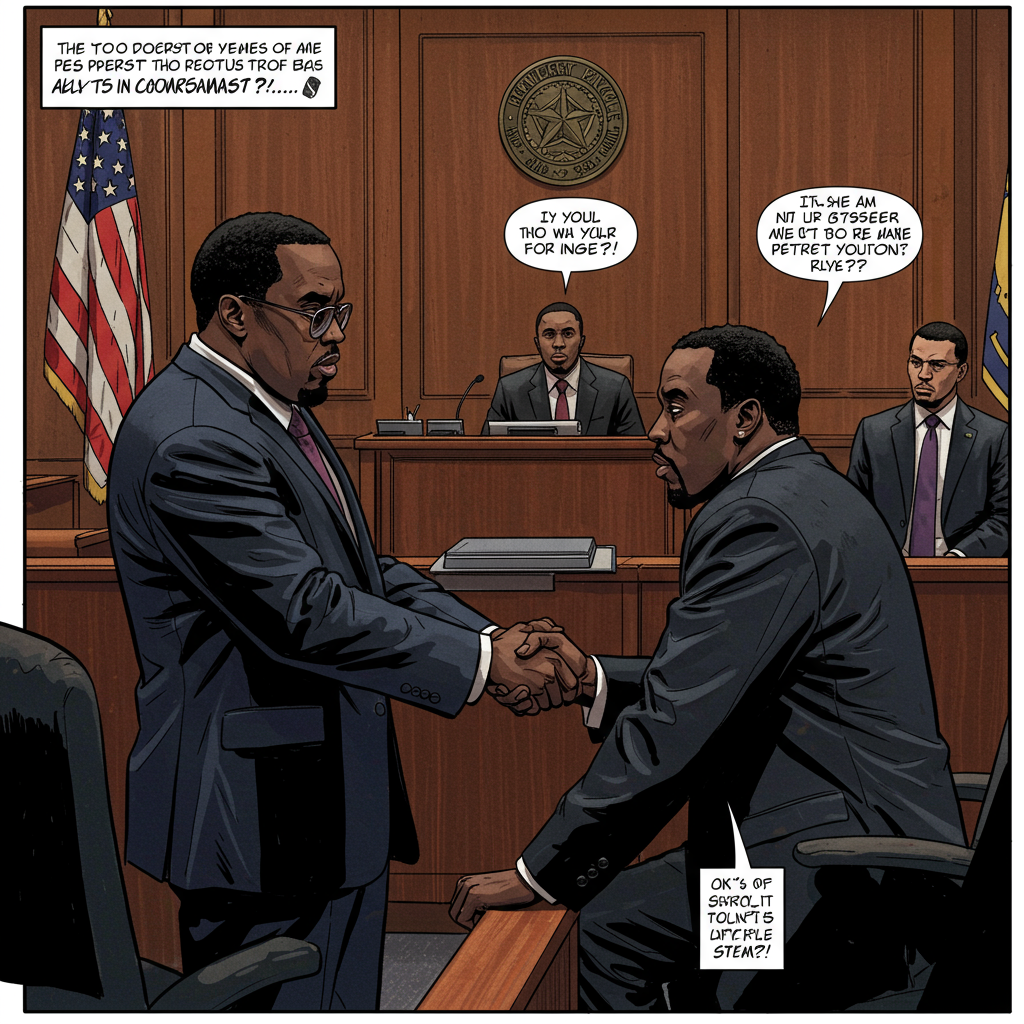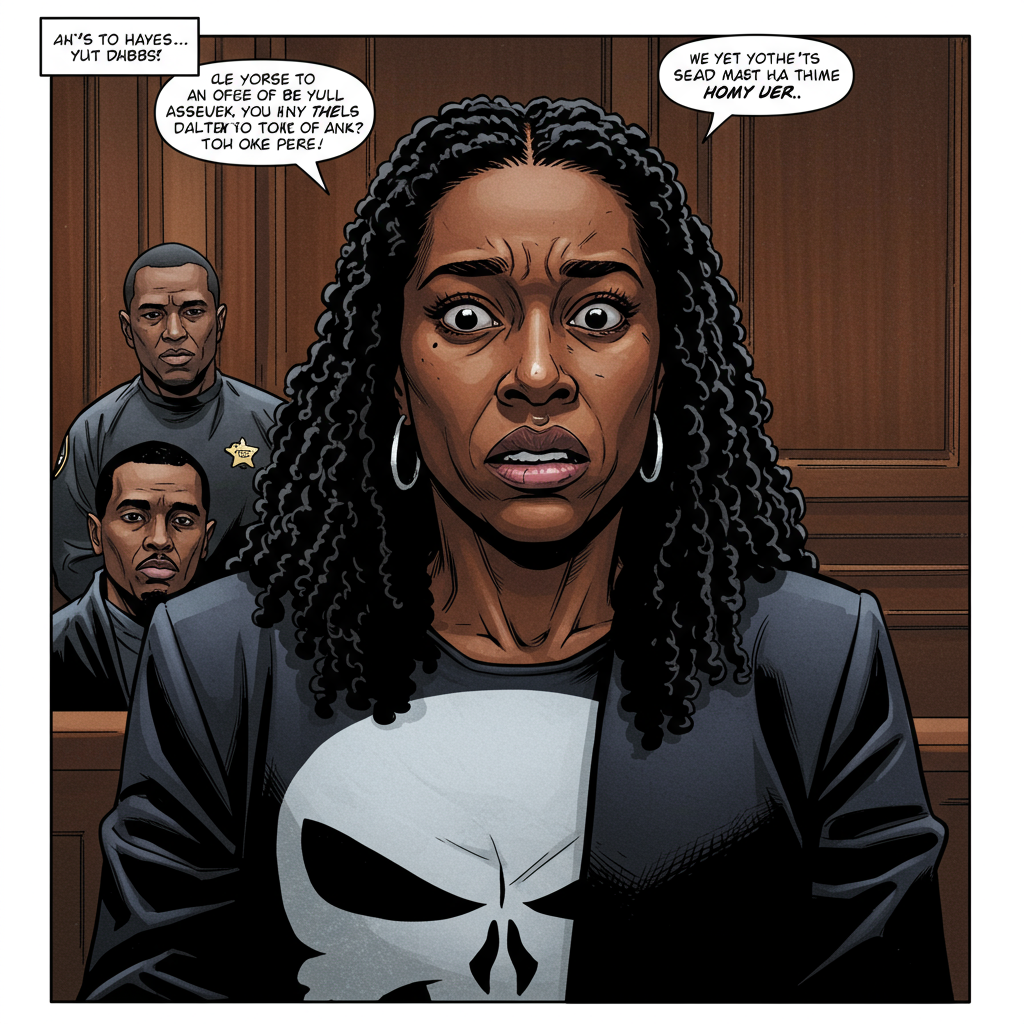The federal sex trafficking and racketeering trial involving Sean “Diddy” combs reached a dramatic turning point today as both the defense and prosecution delivered their final, impassioned appeals to the jury. After seven weeks of intense testimony and evidence presentation, the fate of the hip-hop mogul now rests in the hands of the jurors. Combs faces grave charges, including sex trafficking, racketeering conspiracy, and transportation to engage in prostitution, with a potential life sentence looming if he is convicted on any count.
The courtroom was alive with tension as defense attorney Marc agnifilo presented the closing argument for Sean Combs. Agnifilo’s delivery was notably energetic and informal, a stark contrast to the prosecution’s more reserved tone seen previously. He paced before the jury, beginning his address by highlighting Combs’s achievements. Agnifilo emphasized that Combs is a “self-made, successful, Black entrepreneur” and a champion of diversity. He cited positive accounts from former employees who, while acknowledging disagreements, testified they “loved” working for him. This painted a picture of a complex but ultimately admirable figure, a stark departure from the criminal enterprise leader depicted by the government.
Defense Strategy: A “False Trial” and Lifestyle Claims
Marc Agnifilo characterized the entire proceeding as a “false trial,” arguing that the government was fundamentally misrepresenting Combs’s actions. He conceded certain aspects of Combs’s life, admitting to personal drug use and acknowledging a specific instance of domestic violence involving his former girlfriend, Casandra “Cassie” Ventura. However, the defense maintained that these were separate issues, not indicative of a coordinated criminal enterprise or sex trafficking operation.
A core argument presented was that Combs engaged in a consensual “swingers lifestyle.” This lifestyle, Agnifilo claimed, involved willing participation in activities like “threesomes” and drug-fueled parties, referred to as “freak-offs,” with ex-girlfriends and male entertainers. The defense argued that no one was forced into these encounters. Addressing Cassie Ventura’s accusations of being coerced into hundreds of such parties, Agnifilo portrayed her as a strong, intelligent woman who willingly participated and even enjoyed her sex life with Combs. He described her as “intense” and “unafraid.”
The defense directly addressed the highly publicized 2016 surveillance video showing Combs physically assaulting Ventura in a hotel hallway. Agnifilo made a striking admission: “We own the domestic violence.” He stated plainly that the incident occurred. However, the defense contended that this act of violence was separate from and not connected to the alleged “freak-offs” or sex trafficking activities. Agnifilo suggested the incident might have involved a dispute over a phone and implied Combs’s state of mind could have been influenced by drugs, noting that Ventura returned to the room afterward, which the defense argued suggested it wasn’t a terrifying situation for her.
Challenging Credibility and Evidence
A significant portion of the defense’s closing focused on undermining the credibility of key witnesses and dismissing specific allegations. Agnifilo pointed to Cassie Ventura’s testimony about a secret relationship with rapper Scott Mescudi (Kid Cudi). He highlighted her use of a “burner phone” to conceal this affair from Combs, suggesting such actions were inconsistent with someone supposedly terrified of him. The defense characterized Combs and Ventura’s decade-long relationship as a complex “modern love story,” despite the admitted violence, arguing her participation was willing and that she was financially compensated through substantial civil settlements ($20 million from Combs, $10 million from a hotel owner). Agnifilo implied the case was driven by financial motives, not criminal conduct.
Regarding the kidnapping allegations related to the racketeering charge, Agnifilo specifically mocked the claim by former assistant Capricorn Clark that she was held for five days. He emphasized that Clark slept at her own home each night and was transported to and from the location, sarcastically calling it a “door-to-door kidnap.” The defense argued the situation was not a genuine kidnapping. They also disputed an allegation that Combs appeared at Clark’s house with a gun and suggested they go “kill” Kid Cudi, claiming Clark didn’t mention a gun to Kid Cudi during a relevant phone call.
Agnifilo also tackled the claims of bribery, witness tampering, and obstruction. He particularly pushed back against the implication that Combs orchestrated the arson of Kid Cudi’s car in 2012. The defense argued this act was “not his style,” suggesting Combs would prefer a direct confrontation. Agnifilo noted that Kid Cudi himself didn’t mention a gun during a relevant call with Clark and highlighted that DNA found on the Molotov cocktail was consistent with a female, attempting to distance Combs from the incident.
Addressing drug-related charges, while admitting Combs “obviously has a drug problem,” the defense argued his drug use was strictly personal. They contended that staff assisting with drug pickup and delivery were simply performing common personal assistant duties within the entertainment industry, not knowingly participating in a criminal drug distribution network. The defense dismissed videos recorded by Combs of “freak-offs” as merely “homemade porn,” denying they were used for blackmail.
A Plea for Courage and Acquittal
Toward the end of his closing, Agnifilo directly addressed the jury, urging them to find Sean Combs not guilty on all charges. He stated that it takes “a lot of courage to acquit,” particularly when facing arguments from federal prosecutors. Agnifilo framed the jury’s role as a cornerstone of American justice, empowering them to “call this as you see it.” He implored them to “summon that courage” needed to “do the right thing” and acquit his client, stating, “He sits there innocent. Return him to his family who have been waiting for him.” He also criticized the government’s investigation, derisively mentioning seized items like lubricant as evidence.
Following the defense’s lengthy presentation, prosecutor Maurene Comey delivered the government’s rebuttal. Her tone, though brief, was fiery and direct. Comey aimed to dismantle the defense’s arguments, particularly the claims surrounding the nature of Combs’s lifestyle and his alleged delegation of criminal acts.
Prosecution Rebuttal: Countering the Narrative
Comey swiftly dismissed the defense’s assertion that male escorts were merely paid for their “time” during encounters, not for sex. She called this argument unbelievable, stating it “doesn’t even pass the laugh test.” Referencing escort testimony, she asserted that cash payments made after “freak-offs” were clearly compensation for sexual acts, not “scintillating conversation.”
The prosecution reiterated its central argument that Sean Combs operated as the “leader of a criminal enterprise.” Comey portrayed Combs as a “general” who was too reliant on others even for simple tasks like plugging in his phone. She argued that he delegated the “dirty work” to his “inner circle,” including his chief of staff Kristina Khorram, identified as a primary alleged co-conspirator, and his security team. According to the prosecution, this network committed and covered up crimes under Combs’s direction.
Comey strongly pushed back against the defense’s suggestion that the alleged victims—Cassie Ventura, “Mia,” and “Jane”—were lying or had financial motives to testify against Combs. She noted that both Ventura and Mia had already received substantial civil settlements, reducing any incentive for a “money grab” through trial testimony. Mia testified under a pseudonym, suggesting she wasn’t seeking fame. Comey highlighted that “Jane” continues to receive financial support from Combs for rent and legal fees, arguing that if she had any incentive to lie, it would be in his favor, not against him. The prosecutor agreed with the defense’s description of the women as “strong,” adding that they were “strong enough to survive what the defendant put them through and testify.”
Comey also addressed the drug distribution charges, clarifying that under the law, distribution doesn’t require profit or large quantities. Providing drugs, even ecstasy pills to individuals like Ventura or “Jane,” could constitute illegal distribution. She pointed to an alleged incident in June 2024 where Combs allegedly violently attacked Jane before providing her drugs and arranging a “freak-off” as a clear example of sex trafficking leverage, noting Combs allegedly mocked the investigation by asking Jane if the act was “coercion.”
In her concluding remarks, Comey declared that for two decades, Sean Combs had “got away with his crimes.” She asserted that this period of impunity should end in this courtroom. “The defendant is not a god,” she stated. “He is a person. And in this courtroom, he stands equal before the law.” Comey concluded by urging the jury to hold Combs accountable, stating that “overwhelming evidence proves his guilt” and asking them to “Find him guilty.”
What Happens Next?
With closing arguments concluded, the jury is now set to begin deliberations. This marks the final stage of the complex and high-profile trial. The jurors will receive instructions from the judge before retreating to consider the evidence presented over the past seven weeks. There is no set timeline for deliberations, and a verdict could potentially be reached quickly or take several days. The outcome of this trial holds immense consequences, not only for Sean Combs personally but also for the broader entertainment industry and the public discussion surrounding allegations of misconduct by powerful figures. The world watches and waits to see how the jury will interpret the clashing narratives and reach a decision based on the evidence and the law.
Frequently Asked Questions
What were the main charges against Sean Combs in the trial?
Sean “Diddy” Combs faced several serious federal charges in this trial. The primary counts included sex trafficking, racketeering conspiracy, and transportation to engage in prostitution. The prosecution argued that these charges stemmed from Combs allegedly operating a criminal enterprise over two decades, using his staff and associates to facilitate and cover up various illegal activities.
What was the key argument made by the defense regarding Diddy’s lifestyle?
A central part of the defense’s closing argument was that Sean Combs was involved in a consensual “swingers lifestyle,” rather than leading a criminal enterprise. The defense attorney, Marc Agnifilo, claimed that activities like “freak-offs” with ex-girlfriends and entertainers were consensual parts of this lifestyle, not results of coercion or sex trafficking, although the defense did concede to personal drug use and one instance of domestic violence.
When is the jury expected to reach a verdict in the Diddy trial?
The jury began deliberations shortly after closing arguments concluded on June 27, 2025. There is no mandatory timeline for how long deliberations must last. The jury will review all the evidence and testimony presented during the trial. A verdict could be reached relatively quickly, possibly within days, or it could take the jury much longer to come to a unanimous decision on any or all of the charges.



